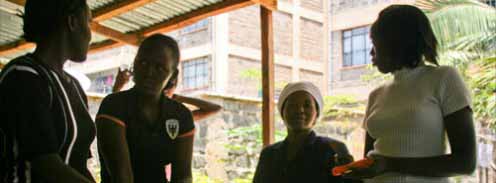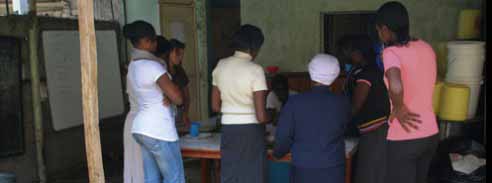CDTD, Kenya: Empowering Domestic Workers through Community Advocacy and Domestic Training Services
Interview with Edith Murogo, Founder of Center for Domestic Training and Development
![]() CDTD’s vision is to contribute to a society where women are empowered and provided with opportunities to grow and realise their full potential. The Center’s mission is to strengthen the potentiality of the less privileged through advocacy, temporary shelter, skills training, psycho-social support and economic empowerment in order to become productive members of the society.
CDTD’s vision is to contribute to a society where women are empowered and provided with opportunities to grow and realise their full potential. The Center’s mission is to strengthen the potentiality of the less privileged through advocacy, temporary shelter, skills training, psycho-social support and economic empowerment in order to become productive members of the society.
GAATW discussed via phone interview the work of CDTD with Edith Murogo.
What were the main objectives and challenges when you started setting up these training centres for domestic workers in 2001? How has it evolved and which service programmes have been successful so far?
 The Centre for Domestic Training and Development(CDTD) was started in 2001. Before it was formalised as an NGO, we initiated a small training program for 5 women. We tried to experiment to see if creating a training program will work for potential domestic workers. A lot of domestic worker bureaus are run by unscrupulous individuals and there is no regulation to help protect domestic workers. Thus we saw the need of providing women from disadvantaged backgrounds with life skills and knowledge of domestic workers rights. After the informal training, we helped them find an employer by placing small job advertisements in public areas. This initiative became the base for building a more established training centre for domestic workers.
The Centre for Domestic Training and Development(CDTD) was started in 2001. Before it was formalised as an NGO, we initiated a small training program for 5 women. We tried to experiment to see if creating a training program will work for potential domestic workers. A lot of domestic worker bureaus are run by unscrupulous individuals and there is no regulation to help protect domestic workers. Thus we saw the need of providing women from disadvantaged backgrounds with life skills and knowledge of domestic workers rights. After the informal training, we helped them find an employer by placing small job advertisements in public areas. This initiative became the base for building a more established training centre for domestic workers.
Soon after this initiative, we were able to generate funds to run a full curriculum for training domestic workers and that was the start of the Center. The objective behind the training program is to develop skills in handling domestic work and at the same time to raise awareness about their rights and fair working conditions. CDTD offers professional household management training and job assistance.
What are the services that CDTD provides for domestic workers?
 CDTD is offering Homecare Management Courses where students learn catering, housekeeping, childcare, entrepreneurship, computer applications and other vocational skills. They are also taught to negotiate decent salaries and fair working conditions. Moreover, we also aim to raise awareness among domestic workers about reproductive health and HIV, human trafficking and safe migration issues.
CDTD is offering Homecare Management Courses where students learn catering, housekeeping, childcare, entrepreneurship, computer applications and other vocational skills. They are also taught to negotiate decent salaries and fair working conditions. Moreover, we also aim to raise awareness among domestic workers about reproductive health and HIV, human trafficking and safe migration issues.
Trainings are conducted at the centers in Eastleigh and Githurai for a period of one month.
CDTD also supports job placements of more than 20 students each month. CDTD provides an orientation for possible employers to ensure that workers rights are recognised in the workplace.
The CDTD runs a Literacy program to ensure that domestic workers who cannot read or write are equipped with basic reading, writing and arithmetic skills. Those who wish to sit for national examinations are also taught on a part-time basis by volunteer teachers.
CDTD beneficiaries who are aggrieved by employers seek help from our Placement Officer who then intervenes. CDTD also has a labour officer as part of their workforce. The labour officer has helped intervene for CDTD trained domestic workers. The Centre also receives complaints from domestic workers who are not enrolled in our training programme. Some of these cases are referred to the trade union for domestic workers that we are in contact with. Sometimes we receive cases for example where domestic workers are held accountable for minor damages in the household leading to withholding of their salary, poor remuneration, sexual abuse and physical violence among others. Some Employers force Domestic workers to pay a certain amount for broken items. The trade unions and CDTD act as mediators between domestic workers and their employers in order to settle the case.
CDTD provides shelter, food, medical care and basic necessities to all its beneficiaries who have nowhere to stay while they are training and also during job placements. Abused Domestic workers are hosted as they await the determination of their cases. For those with court cases, CDTD links them with collaborating partners who offer free legal aid.
Who are the beneficiaries and where they are mostly from?
Domestic workers are predominately from poor economic backgrounds in rural areas. A lot of these young women left their villages to go to urban centers like Mombasa, Nakuru and Nairobi in Kenya. They are among the most vulnerable and at risk to exploitation and human trafficking.
CDTD also works with refugees in Eastleigh. In 2007, CDTD partnered with UNHCR to benefit urban refugees who are exploited by host families in exchange of accomodation. CDTD now runs a vocational training centre for urban refugee girls and youth so that they can further integrate into the local host community and enhance their chances for self reliance and income generation. A second component of the partnership with UNHCR involves shelter and transportation for refugees in transit to the refugee camps especially Kakuma but also Daadab.
How do you see the conditions of women engaged in domestic work? What are the difficulties faced by domestic workers in Kenya?
According to the law, domestic workers salary falls under the general workers wages category. One of the challenges is the poor implementation of the law to execute equal pay for domestic workers. Also there is little protection for women in the informal labour sector. Cases of abuse in salary and employers not willing to enter into contract has remained a big challenge within this sector.
How does your organisation respond to their needs?
Our organisation takes action through vocational learning skills, life skills, social awareness and job placements.
With the new ILO Convention on Decent Work for Domestic Workers, we now have a platform to negotiate for better working conditions for domestic workers. We think that participation of domestic workers themselves is invaluable when we do national level advocacy. Domestic workers should be given equal space and self-representation in dialogues and other public foras.
How do you see your future work?
We see a broader programme of domestic workers transformation and campaign towards the ratification of the ILO Convention on Decent Work for Domestic Workers. CDTD will also lobby for better wages for domestic workers and a subsidiary legislation that will protect the rights of domestic workers.

